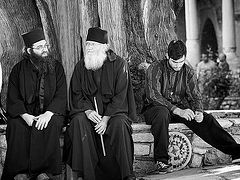There is a psalm found in the Six Psalms chanted at every Matins in the Orthodox Church that is unique among the psalms of the Psalter. Psalm 88 (87 in the Septuagint numeration) is a psalm that contains not a glimmer of light or hope. It begins with the words, “O Lord my God of my salvation, I call for help by day, I cry out in the night before You! Let my prayer come before You; incline Your ear to my cry! For my soul is full of troubles, and my life draws near to Sheol. I am reckoned among those who go down to the Pit; I am a man who has no strength, like one forsaken among the dead, like the slain that lie in the grave, like those whom You remember no more, for they are cut off from Your hand. You have laid in in the depths of the Pit, in the regions dark and deep.” The psalmist continues his complaint for verse after verse, with no hope in sight. And it ends on a note of despair.
This is unique among the psalms. Many of the psalms contain such complaints and laments. In many other psalms the psalmist cries to God, outlining his trouble and asking for help. Take, for example, Psalm 6: “I am weary with my moaning; every night I flood my bed with tears. I drench my couch with my weeping. My eyes waste away because of grief; it grows weak because of all my foes.” Yet his psalm ends on a note of confidence and joy: “All my enemies shall be ashamed and sorely troubled; they shall turn back and be put to shame in a moment”. Or consider Psalm 10. It begins with a perplexed questioning of God’s love: “Why do You stand afar off, O Lord? Why do You hide Yourself in times of trouble? In arrogance the wicked hotly pursue the poor”. Yet this psalm also ends on a note of triumph and trust in God: “O Lord, You will hear the desire of the meek; You will strengthen their heart, You will incline Your ear to do justice to the fatherless and the oppressed, so that man who is of the earth may strike terror no more!” But there is no such hopeful ending in Psalm 88. This terrible psalm ends with the words that fall like a pall over the human heart: “You have caused lover and friend to shun me; my companions are in darkness.” The psalmist cries to God, and there is no answer, no light at the tunnel’s end, no hope of a final answer. Fade to black.
Why is such a terrible psalm found in the Psalter? What does it mean? I suggest two things.
First of all, it reveals that God does not shield His children from such times of darkness and despair. The world is dangerous place, and no one is exempt from its dangers or shielded from catastrophe which strikes with arbitrary unfairness. Some preachers (often those smiling at you on television) promise that if you will only become a Christian you will find happy immunity to such dangers, and you will skip through life unscathed, untouched by the disasters and darkness which strike others. You will be healthy and wealthy; you will (in the words of one such happy evangelist) “live like a King’s kid”, and it will never rain down the back of your neck.
Psalm 88 reveals that it is not so. God never promises His children immunity from the darkness which filled the heart of the psalmist with such despair. It is possible that you also will one day be reckoned among those who go down to the Pit, and will dwell in regions dark and deep. You will look around for help and comfort, only to find that your companions are in darkness. It does not mean that God has forsaken you, or that you are therefore not one of His children. It does not mean that you have sinned somehow, and that God is punishing you. It only means that God does not shield His own from the common afflictions of men, and that Christian faith requires Christian courage.
Secondly and most importantly, this psalm reveals the depths to which God Himself was willing to descend to save us. For Christ, in assuming our human condition in the womb of a Jewish adolescent girl, also shared all that belonged to that condition, including the darkness and despair which sometimes fall upon the heart. That is why this psalm is used in the Holy Friday Vespers, where it describes the death and burial of Christ: “You have laid Me in the depths of the Pit, in the regions dark and deep”. God did not exempt even His Son from the troubles that darken our life and brings us to despair. On the Cross Christ cried out, “My God, my God, why have You forsaken Me?”, after which He was laid in the regions dark and deep and descended to the Pit, to Sheol. There are no depths to which we can descend that Christ has not already plumbed for our sake.
So what happens next? What happens after Psalm 88? There is no use turning the page of the Psalter to look at Psalm 89, for the Psalter is a collection of psalms, not a sequential theological diary. (Besides, Psalm 89 also ends on a note of anguished perplexity.) To find out what happens next we look not into the pages of the Psalter, but into the life of Christ. After He was laid in the regions dark and deep, and descended to the Pit on the second day of His death, He arose in triumph on the third day. In a blessed exchange, Christ took upon Himself all our human pain and grief, that He might share with us His divine triumph and joy.
The psalms of the Psalter, like everything else in the Hebrew Scriptures, find their fulfillment in Christ, and so to fully understand these psalms, we must look to Jesus to see their meaning in our life. For all its apparent darkness and despair, Psalm 88 ultimately teaches the triumph of God’s love, for in Christ it reveals that even those who dwell in deep darkness can find their hope in Him.





In fact, this was the first time I had really connected with this psalm. The extent of despair expressed by the psalmist I finally understood.